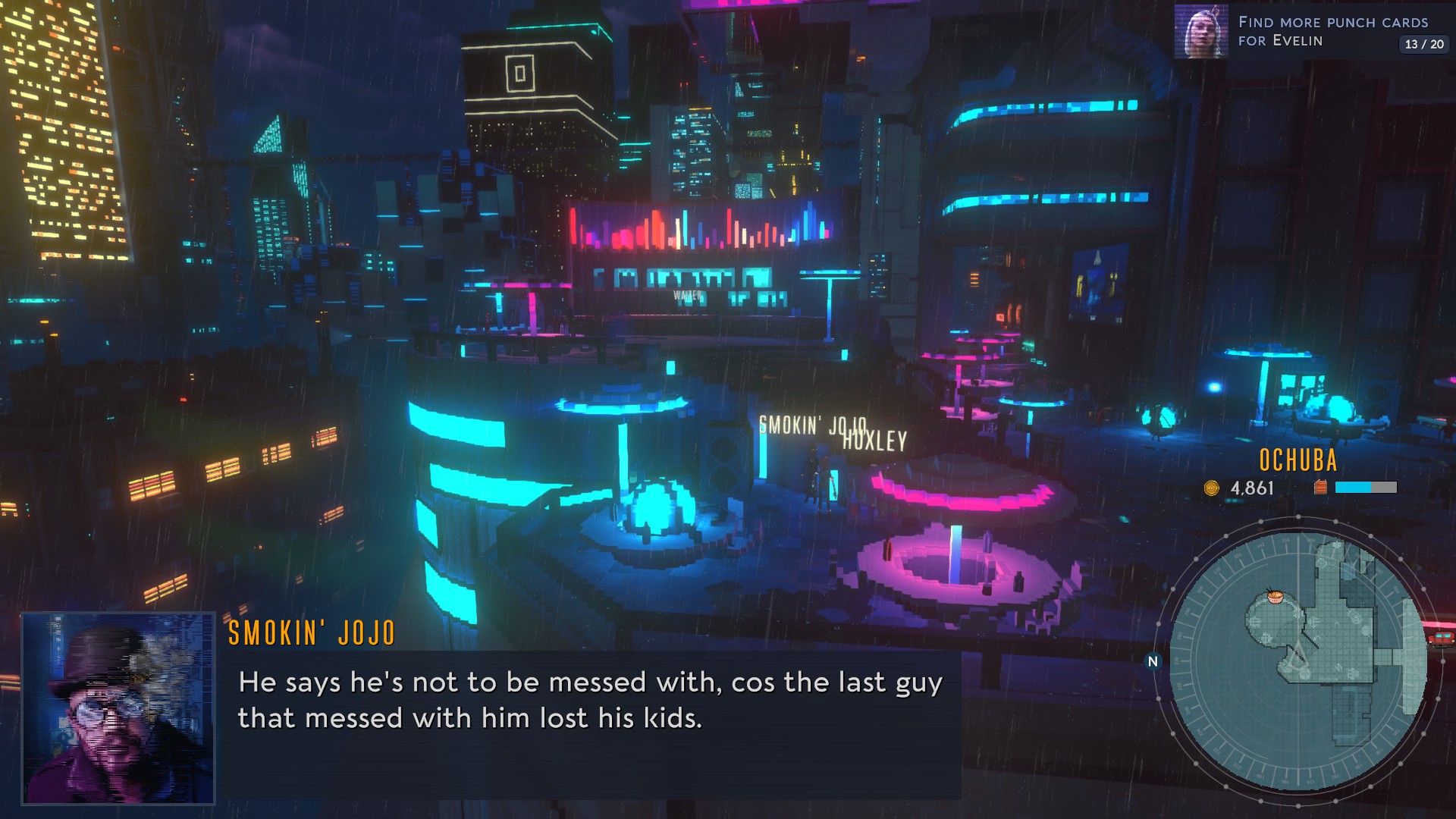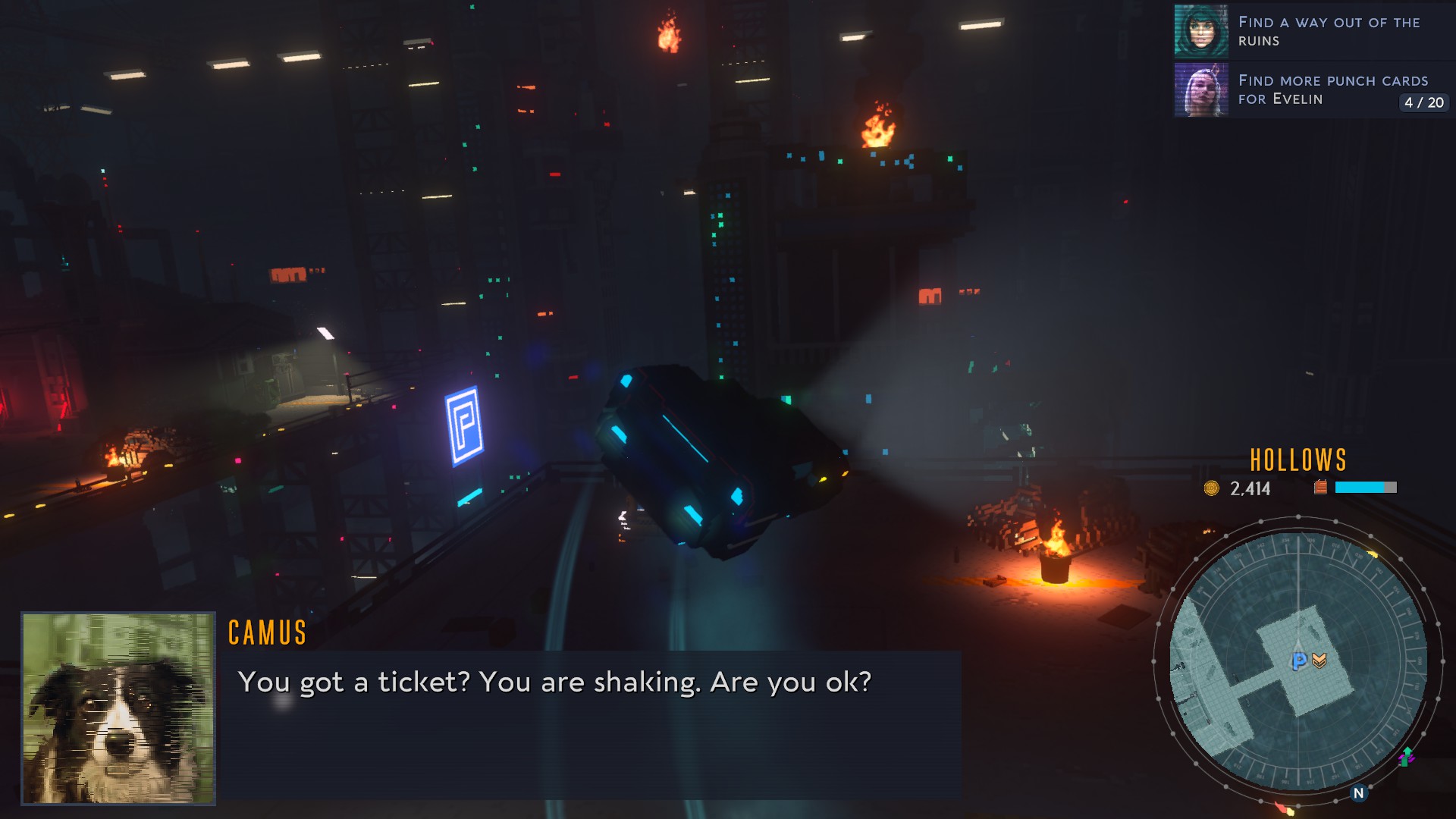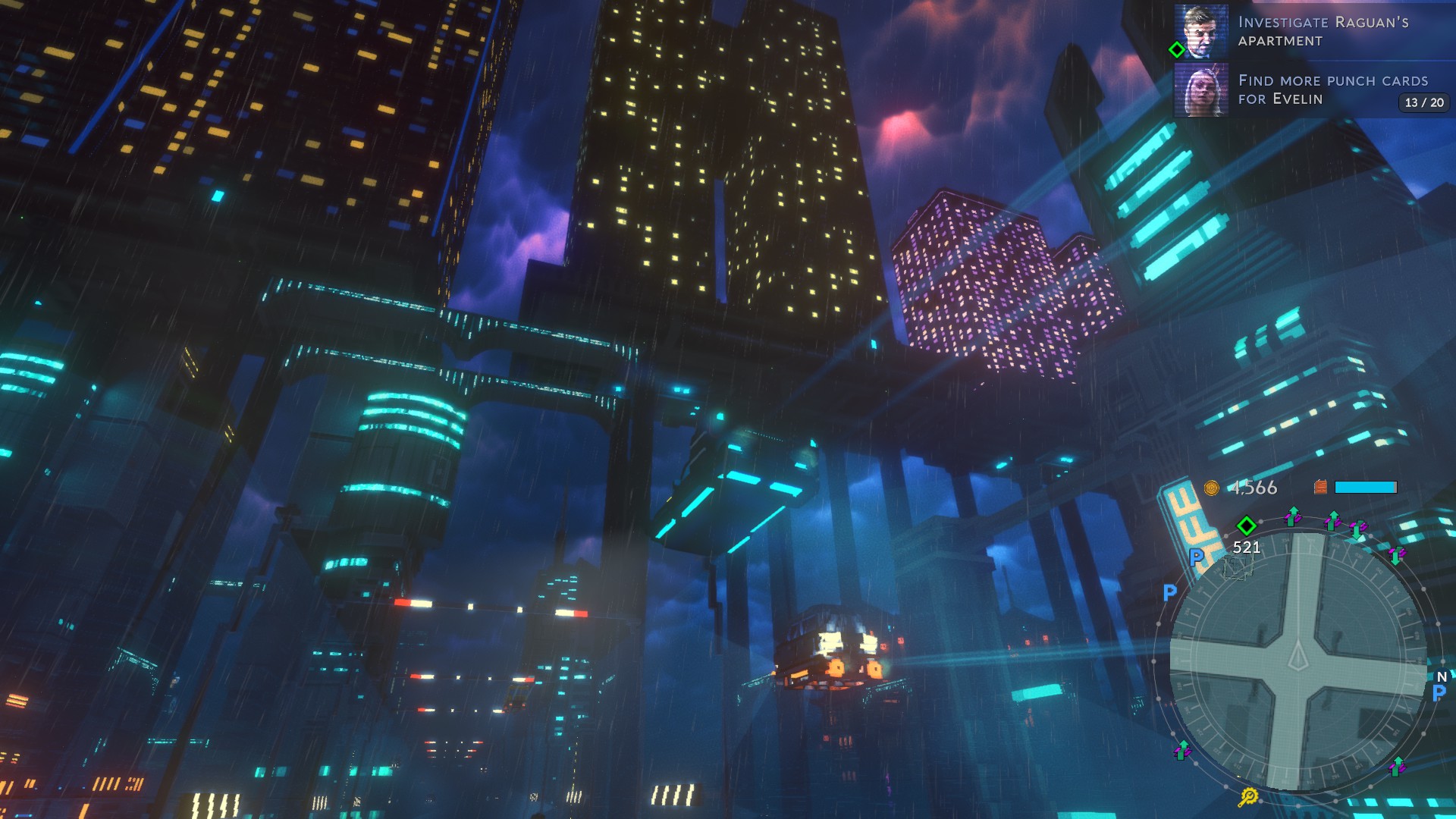The city is the star. Again, that’s not to criticise the characters or story. You play as Rania, a young woman who’s just arrived in Nivalis, the one megacity in a far, far future, to work as a delivery driver for an illicit organisation called Cloudpunk. You’ll drive your flying car around the city, taking orders remotely from a man referred to as Control. It’s really as simple as driving from A to B for the most part. You’ll park your cab and head off on foot to collect each package, then head back, and fly off to your destination. That’s all you’ll be doing, and it’s a testament to how fantastic the city is that this is enough, however little it sounds on paper. Those on foot sections are crucial. Their zoomed out perspective, a little uncomfortable at first, puts you at a perfect distance to see the gorgeous city and its multiple, endlessly moving layers, and papers over the cracks of the voxelly graphical style. Humans and androids alike wander the streets, traffic hums and glows above and below and in the far distance. There are lifts and horizontal transport pads staffed by little operator robots (I assume), and they move about whether you’re using them or not. Nivalis is constantly moving. When you’re driving above it the foot traffic goes on. When you’re walking, the trains shunt by, the advertising blimps drift along, and occasionally police hovercars will rush overhead. It’s an absolutely marvellous place, and a joy to wander around even if there aren’t all that many ways to interact with it. There’s more than just the story jobs. The whole city (minus some areas that are restricted to residents in general within the fiction, although you briefly visit several) is open to you. Though the highways give a speed boost and there are regular traffic routes, there’s nothing stopping you taking shortcuts or flying between or through back alleys and over rooftops, or under bridges, or often both. There’s a feeling too that the city is absolutely enormous beyond the level you’re able to reach as a mostly regular person. Anywhere you can park will have places to buy food and cosmetic items, as well as a handful of other items, and bits of junk lying about on the street. Some of these can be used to repair lifts, opening up another little pedestrian area or convenient shortcut, while others are used in the one-off side jobs you can pick up by talking to certain NPCs. A photo tour would be wonderful, although slightly tricky as the free camera mode only works when you’re stationary. But I’ve not even explored much, which now that I think of it is surprising. I invariably run off into the hills in most games, but in Cloudpunk I’ve gone straight after the next delivery, after the next conversation with the next person. The story has got me curious, which is impressive given that the city is such a draw. Despite the worrisome talk of debt collectors and how harsh life in the city is, Rania doesn’t have much in the way of expenses. You can kit out your car if you like, and the flat you almost never visit, but my natural stinginess mostly took precedent. Fuel and repairs quickly become affordable even if you’re a careless driver, and food is rarely necessary. This is not a survival game, nor a simulation. It’s very much about the story and the strangely cozy ambience of the world. That story isn’t outstanding, but it’s been interesting enough to keep me invested. Tonally, it charts a narrow and difficult course between depicting a cruel hypercapitalist future, and being a place that’s enjoyable to inhabit. Story characters tend to have sad stories, but a lot of one-off side characters are there just for a gentle joke. There’s even a hint of Douglas Adams, with a few explicit (if niche) references to the Hitchhiker books, and one job in particular about a tower full of androids that poked a bit of fun at bureaucracy while layering in some jokes about robot logic. It’s never surreal or outright ZANY, but there’s a consistent feeling of levity. That’s especially true of Camus, the custom AI companion you load into your hovercar, who was previously a dog and retains a charming, extremely canine sincerity. Rania herself gets some good lines in even when she’s getting crap for being an Arab woman (generally from characters so contemptible that the sting of their attitudes is very mild. They, not Rania, are absolutely the butt of the joke). Between the naive and over-literal Camus, the warm, slightly sad voice of Control, and the wry, independent spirit of Rania herself, there’s an excellent balance of warmth, humour, and just a little bit of darkness. The city is ancient, and its operation largely a mystery to everyone, to the point that what exactly keeps it running is treated mythically, and even slightly taboo to talk about. It soon becomes clear that something is very wrong with it, potentially catastrophically so, and everyone’s talk of collapsing districts and major accidents is building to something huge. Naturally, you get caught up in this, but even before you’re making decisions about the future of Nivalis, some of your jobs will involve moral dilemmas. Do you deliver a package that you think will hurt people? Do you send this guy’s belongings to settle his debts, or to his family? Many of them are very small scale questions, and as far as I can tell few have major consequences, but I like that. It fits the premise - illegal or not, you are just another delivery driver after all. And there’s a truth to it - most of us have, I sincerely hope, broken the rules to help someone out at least once in our lives, even if it wouldn’t make much difference in the long run. Although I will admit that I delivered a probable bomb to its target rather than dump it in the garbage, because I assumed there were people working down there and they didn’t deserve that either. Cloudpunk doesn’t fall short on sci fi credentials either. I particularly like how androids are portrayed. It becomes clear that they get a raw deal and are discriminated against, but in a way that assimilated populations are. They’re not segregated and overtly oppressed as they typically are in such works. Instead, they’re technically given some rights, but are still disadvantaged, exploited, and patronised to ensure an uneven playing field. There’s also a particularly cool sci-fi virus, Pallid 3.0, whose effects offer exactly the right kind of semi-plausibility that the genre needs. Even Deus Ex scored no points here, with its generic plague just sort of vaguely draining and killing victims, where Cloudpunk puts them through an imaginative horror. I still have some unanswered questions about the setting. For one thing, it’s not clear how an organisation so illegal that they’re specifically asked about by police as matter of routine operates so openly. They have a building with a glowing billboard advertising their name! It’s directly next to a main road! Just … just go there, officer! I know you’re probably all on the take but come on. At least make them take the sign down. Still though. I’m struggling a bit to get across that Cloudpunk is a sort of limited game while also being very impressive. Perhaps I should say what it does wrong? Well, there are no graphics options for one, and loading times are a bit poor. I had no trouble running it, but it does run pretty hot on my PC. That might seem surprising, but you really have to see it moving. It’s unspeakably pretty. There’s one bit where you’re taken up a whole city tier, via a long platform lift, while having a conversation with Control as you climb past endless layers of catwalks, roads, and railways, all bustling with movement. You don’t feel like the centre of the world. You can really believe the whole city is moving all the time, whether you’re there or not. You might not be able to do much besides walk and drive around it, but it’s one of the best cities I’ve ever seen, and I spent a fair amount of time just idling around and watching it go while listening to the rain, the muffled thumping of nightclubs, and the excellent music (and alternating silences! Bonus point!). It feels unappreciative to wish that there could be even more of it, but it’s like that perfect cup of tea. You’ll always want another one.






